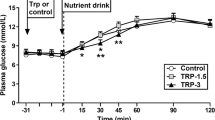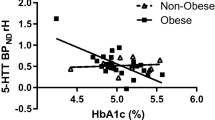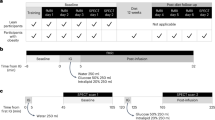Abstract
OBJECTIVE: In obese patients, brain serotonergic stimulation via orally administered 5-hydroxy-tryptophan (5-HTP), the precursor of serotonin, causes decreased carbohydrate intake and weight loss. Since diabetes mellitus is associated with depressed brain serotonin, hyperphagia and carbohydrate craving, we hypothesized that in diabetic patients, orally administered 5-HTP stimulates brain serotonergic activity and thus normalizes eating behaviour. To test this hypothesis, we investigated whether in diabetic patients: 1) predicted brain serotonin concentrations are depressed as a result of decreased availability of the precursor, tryptophan; and 2) oral 5-HTP is effective in reducing energy and carbohydrate intake.
SUBJECTS AND METHODS: 25 overweight non-insulin dependent diabetic outpatients were enrolled in a double-blind, placebo-controlled study, and randomized to receive either 5-HTP (750 mg/d) or placebo for two consecutive weeks, during which no dietary restriction was prescribed. Energy intake and eating behaviour, as expressed by macronutrient selection, were evaluated using a daily diet diary. Plasma amino acid concentrations and body weight, as well as serum glucose, insulin and glycosylated haemoglobin were assessed.
RESULTS: 20 patients (nine from the 5-HTP group and 11 from the Placebo group) completed the study. Brain tryptophan availability in diabetic patients was significantly reduced when compared to a group of healthy controls. Patients receiving 5-HTP significantly decreased their daily energy intake, by reducing carbohydrate and fat intake, and reduced their body weight.
CONCLUSIONS: These data confirm the role of the serotonergic system in reducing energy intake, by predominantly inhibiting carbohydrate intake, and suggest that 5-HTP may be safely utilized to improve the compliance to dietary prescriptions in non-insulin dependent diabetes mellitus.
This is a preview of subscription content, access via your institution
Access options
Subscribe to this journal
Receive 12 print issues and online access
$259.00 per year
only $21.58 per issue
Buy this article
- Purchase on Springer Link
- Instant access to full article PDF
Prices may be subject to local taxes which are calculated during checkout
Similar content being viewed by others
Author information
Authors and Affiliations
Rights and permissions
About this article
Cite this article
Cangiano, C., Laviano, A., Ben, M. et al. Effects of oral 5-hydroxy-tryptophan on energy intake and macronutrient selection in non-insulin dependent diabetic patients. Int J Obes 22, 648–654 (1998). https://doi.org/10.1038/sj.ijo.0800642
Received:
Revised:
Accepted:
Published:
Issue Date:
DOI: https://doi.org/10.1038/sj.ijo.0800642
Keywords
This article is cited by
-
Seasonal and Geographic Variation in Serotonin Content in Sea Buckthorn
Plant Foods for Human Nutrition (2023)
-
Hemp and buckwheat are valuable sources of dietary amino acids, beneficially modulating gastrointestinal hormones and promoting satiety in healthy volunteers
European Journal of Nutrition (2022)
-
Transition metal coordination compounds of an antiobesity serotoninergic ligand: spectroscopic characterization and adipogenesis activity
Transition Metal Chemistry (2017)
-
Satiety and amino-acid profile in overweight women after a new treatment using a natural plant extract sublingual spray formulation
International Journal of Obesity (2009)



